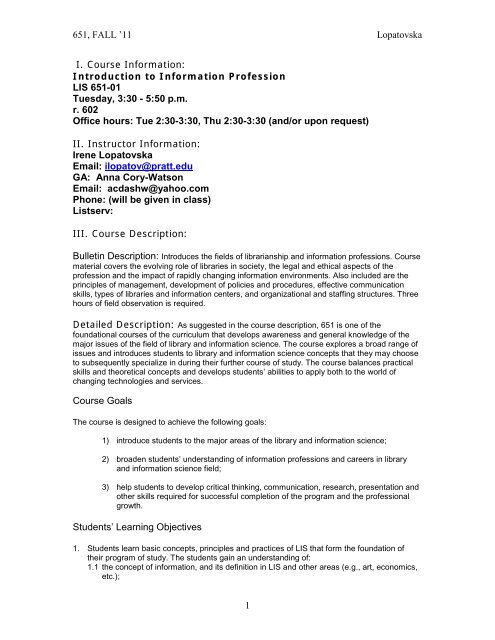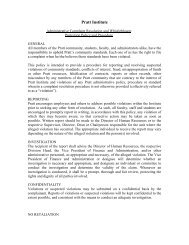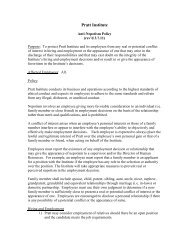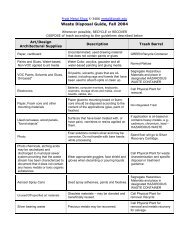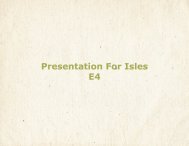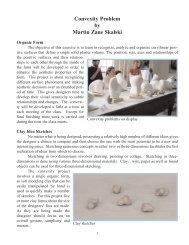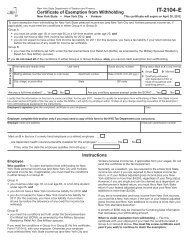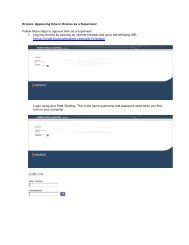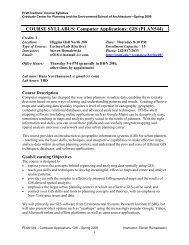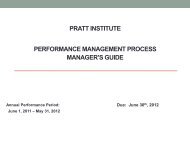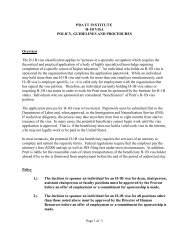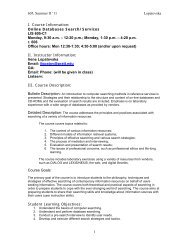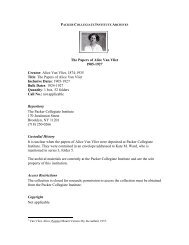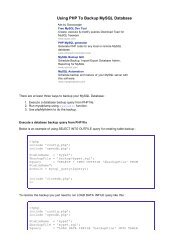Sample Syllabus - Pratt Institute
Sample Syllabus - Pratt Institute
Sample Syllabus - Pratt Institute
Create successful ePaper yourself
Turn your PDF publications into a flip-book with our unique Google optimized e-Paper software.
651, FALL ’11 Lopatovska<br />
I. Course Information:<br />
Introduction to Information Profession<br />
LIS 651-01<br />
Tuesday, 3:30 - 5:50 p.m.<br />
r. 602<br />
Office hours: Tue 2:30-3:30, Thu 2:30-3:30 (and/or upon request)<br />
II. Instructor Information:<br />
Irene Lopatovska<br />
Email: ilopatov@pratt.edu<br />
GA: Anna Cory-Watson<br />
Email: acdashw@yahoo.com<br />
Phone: (will be given in class)<br />
Listserv:<br />
III. Course Description:<br />
Bulletin Description: Introduces the fields of librarianship and information professions. Course<br />
material covers the evolving role of libraries in society, the legal and ethical aspects of the<br />
profession and the impact of rapidly changing information environments. Also included are the<br />
principles of management, development of policies and procedures, effective communication<br />
skills, types of libraries and information centers, and organizational and staffing structures. Three<br />
hours of field observation is required.<br />
Detailed Description: As suggested in the course description, 651 is one of the<br />
foundational courses of the curriculum that develops awareness and general knowledge of the<br />
major issues of the field of library and information science. The course explores a broad range of<br />
issues and introduces students to library and information science concepts that they may choose<br />
to subsequently specialize in during their further course of study. The course balances practical<br />
skills and theoretical concepts and develops students’ abilities to apply both to the world of<br />
changing technologies and services.<br />
Course Goals<br />
The course is designed to achieve the following goals:<br />
1) introduce students to the major areas of the library and information science;<br />
2) broaden students’ understanding of information professions and careers in library<br />
and information science field;<br />
3) help students to develop critical thinking, communication, research, presentation and<br />
other skills required for successful completion of the program and the professional<br />
growth.<br />
Students’ Learning Objectives<br />
1. Students learn basic concepts, principles and practices of LIS that form the foundation of<br />
their program of study. The students gain an understanding of:<br />
1.1 the concept of information, and its definition in LIS and other areas (e.g., art, economics,<br />
etc.);<br />
1
651, FALL ’11 Lopatovska<br />
1.2 similarities and differences between library and information sciences, relationships<br />
between research and professional practice;<br />
1.3 principles and key aspects of a) information organization and management; b) human<br />
information behavior; c) information systems’ design; d) information institutions’<br />
management; e) information policy issues; f) ethical and legal issues (e.g., democratic<br />
and constitutional principles such as free speech and free press), and other issues<br />
1.4 past, present and emerging library and information practices and settings<br />
1.5 ethical and moral principles of the profession and the importance of balancing<br />
professional, personal and cultural values<br />
1.6 diversity of information needs, uses, users, and sources, including international and<br />
digital contexts<br />
2. Students develop understanding of information profession and learn the importance of<br />
professional development and social skills. The students should:<br />
2.1 develop an understanding of career paths available in the library and information science<br />
field<br />
2.2 identify and internalize core professional values<br />
2.3 become part of professional community(-ies)<br />
2.4 become familiar with professional development and continuing education techniques<br />
3. Students begin to develop their individual voice as information professionals as they acquire<br />
skills needed to analyze and evaluate information, contextualized and express their views,<br />
and present them in class project presentations as well as written reports. Students learn to:<br />
3.1 critically examine information institutions, practices and services<br />
3.2 critically examine library and information science literature<br />
3.3 analyze and present their findings in a professional setting as both written reports as well<br />
as oral presentations<br />
LMS Program students: please see the last section of the syllabus for New York State Learning<br />
Standards applicable to this course and information on observation conducted within the scope of<br />
this class.<br />
Course Calendar/Schedule [subject to change]:<br />
Wee<br />
k<br />
#<br />
Lectures &<br />
Practice<br />
Readings<br />
Assignmen<br />
ts*<br />
1 Aug<br />
30<br />
Introduction,<br />
Course Overview<br />
Select topic<br />
for the library<br />
history<br />
presentation<br />
2 Sept<br />
6<br />
Information and<br />
Information<br />
Structures<br />
Information,<br />
Misinformation,<br />
Disinformation,<br />
Propaganda<br />
Buckland, M. (1991). Information and Information Systems.<br />
New York: Preaeger, Chapters 1, 4, 5, & 6. <strong>Pratt</strong> Manhattan<br />
Library<br />
Kirk, E. E. (2001). Information and Its Counterfeits:<br />
Propaganda, Misinformation and Disinformation. In Research<br />
Help found at The Sheridan Library Johns Hopkins. Retrieved<br />
March 1, 2008, from<br />
http://www.library.jhu.edu/researchhelp/general/evaluating/cou<br />
nterfeit.html<br />
Selection of a<br />
topic for<br />
Assignment 3<br />
is due<br />
Start working<br />
on<br />
Assignment 2<br />
and 4.<br />
Optional: Bates, M. J. (2006). Fundamental Forms of<br />
Think/find your<br />
2
651, FALL ’11 Lopatovska<br />
Information.<br />
Journal of the American Society for Information and<br />
Technology, 57(8), 1033-1045.<br />
Available at:<br />
http://www.gseis.ucla.edu/faculty/bates/articles/NatRep_info_1<br />
1m_050514.html<br />
examples of<br />
data,<br />
information,<br />
misinformation<br />
and<br />
disinformation<br />
3 Sept<br />
13<br />
Human<br />
Information<br />
Behavior<br />
Kuhlthau, C. C. (1991). Inside the search process: Information<br />
seeking from the user’s perspective. Journal of the American<br />
Society for Information Science, 42(5), 361–371. course<br />
website.<br />
or<br />
Wilson, T. D. (2000) Human Information Behavior. Informing<br />
Science, 3(2). Available at:<br />
http://inform.nu/Articles/Vol3/v3n2p49-56.pdf<br />
and<br />
Ross, C. S. (2003). The reference interview: why it needs to<br />
be used in every (well, almost every) reference transaction.<br />
Reference and User Services Quarterly, 43(1), 38-41. H.W.<br />
Wilson Library Literature & Information Science Full-Text<br />
database<br />
Bohn, R. & Short, J. (2009). How much information? 2009<br />
report on consumer affairs. Retrieved from<br />
http://hmi.ucsd.edu/pdf/HMI_2009_ConsumerReport_Dec9_20<br />
09.pdf<br />
Deane. G. (2003). Bridging the value gap: getting past<br />
professional values to customer value in the public library.<br />
Public Libraries 42(5). 315-319. H.W. Wilson Library Literature<br />
& Information Science Full-Text database<br />
4 Sept<br />
20<br />
5 Sept<br />
27<br />
User-centered<br />
perspective:<br />
assessment, user<br />
studies, grant<br />
writing.<br />
Library and<br />
information<br />
sciences:<br />
Historical<br />
perspective<br />
Powell, R. R. (1999). Recent trends in research: A<br />
methodological essay. Library & Information Science<br />
Research, 21(1), 91-119. [special attention to the list of<br />
research methods (pp. 96-98) and their definitions (pp. 101-<br />
112).] <strong>Pratt</strong> Manhattan Library.<br />
http://www.libqual.org/about/about_lq/general_info<br />
http://www.libqual.org/about/about_lq/general_faq<br />
Rutner, J. & Shelf, J. (2010). Still bound for disappointment?<br />
Another look at faculty and library journal collections?<br />
Retrieved from personal communication, November 5, 2010.<br />
Saracevic, T. (1999). Information Science. Journal of<br />
the American Society for Information Science, 50(9),<br />
1051-1063. course website<br />
Shera, J. H. and Egan, M.E. (1953). A review of the<br />
3
651, FALL ’11 Lopatovska<br />
Topics in<br />
Information<br />
Science<br />
present state of librarianship and documentation. In<br />
S.C. Bradford (ed.) Documentation. 2nd ed. London:<br />
Crosby pp. 11-45. course website<br />
6 Oct<br />
4<br />
Information<br />
Technology<br />
Bush, V. (1945). As we may think. Atlantic Monthly. Available<br />
at: http://www.theatlantic.com/doc/194507/bush<br />
Radford, M. L. and Radford, G. P. (1997).<br />
Power, knowledge, and fear: Feminism, Foucault, and the<br />
stereotype of the female librarian. The Library Quarterly, 67(3),<br />
250-266.<br />
Rubin, Chapter 2<br />
Technology Helps Students Learn In E-Library. Available at:<br />
http://www.4029tv.com/education/17164483/detail.html<br />
Leiner, B. (December, 2003). A brief history of the internet. In<br />
Internet Society. Retrieved from<br />
http://www.isoc.org/internet/history/brief.shtml<br />
Liu, Z. (2006). Print vs. electronic resources: a study of user<br />
perceptions, preferences, and use. Information Processing<br />
and Management: an International Journal, 42(2), 583 – 592.<br />
Tenopir, C. (2008).Online systems for information access and<br />
retrieval. Library Trends, 56(4), 816-829.<br />
7 Oct<br />
11<br />
History of<br />
librarianship<br />
Library history<br />
presentations<br />
8 Oct<br />
18<br />
Organization of<br />
Information<br />
Svenonius, E. (2000). Information Organization; Bibliographic<br />
Objectives; Bibliographic Entities. In The Intellectual<br />
Foundation of Information Organization, 1-14. Cambridge: MIT<br />
Press. Read Introduction and Bibliographic objectives<br />
chapters. <strong>Pratt</strong> Manhattan Library<br />
or<br />
Wilson, P. (1968). Subjects and the Sense of Position. In Two<br />
Kinds of Power; An Essay on Bibliographic Control. Berkeley:<br />
University of California Press, 69-92. course website.<br />
and<br />
Rubin, Chapter 4<br />
Travis, K. (Sept. 13, 2010). Crowdsourcing Project Hopes to<br />
Make Short Work of Transcribing Bentham, Chronicle of<br />
Higher Education. Retrieved from:<br />
http://chronicle.com/blogs/wiredcampus/crowdsourcingproject-hopes-to-make-short-work-of-transcribingbentham/26829<br />
4
651, FALL ’11 Lopatovska<br />
9 Oct<br />
25<br />
no class –<br />
midterm break<br />
10 Nov<br />
1<br />
Collection<br />
Development and<br />
Resource<br />
Management<br />
Arizona Collection Development Training Site (All sections).<br />
Available at: http://www.lib.az.us/cdt/collman.aspx<br />
Branin, J., Groen, F., & Thorin, S. (2000). The Changing<br />
Nature of Collection Management in Research Libraries.<br />
Association of Research Libraries. Library Resources &<br />
Technical Services, 44 (1), 23-32. H.W. Wilson Library<br />
Literature & Information Science Full-Text database<br />
Collection Development Policies for Small Libraries<br />
PNLA Quarterly 70(2), Winter 2006, 12-16 H.W. Wilson Library<br />
Literature & Information Science Full-Text database<br />
Note/bookmark:<br />
Collection Development and the Internet, available at:<br />
http://www.loc.gov/acq/colldev/handbook.html<br />
11 Nov<br />
8<br />
12 Nov<br />
15<br />
Library<br />
Management<br />
Discussion of library observations Assignment 2<br />
due<br />
Rubin, Chapter 5 (pp.165-173)<br />
Frank, F. D. & Taylor, C. R. (2004). Talent management:<br />
Trends that will shape the future. Human Resource Planning,<br />
27(1), 33-41. Omni File database<br />
Holcomb, J. M. (2007). Moving into Management: Strategies to<br />
Take the Pinch Out of Stepping into New Shoes. Law Library<br />
Journal, 99(1),167-73. H.W. Wilson Library Literature &<br />
Information Science Full-Text database<br />
Oder, N. (1999). Libraries of the Year: Strategies for Success.<br />
Library Journal 124(2), 52-53. H.W. Wilson Library Literature &<br />
Information Science Full-Text database<br />
Note/bookmark:<br />
• ALA Library Administration and Management<br />
Association:<br />
http://www.ala.org/ala/mgrps/divs/llama/lama.cfm<br />
• SLA Leadership & Management Division:<br />
http://units.sla.org/division/dlmd/<br />
• Libraries Unlimited, Book Companion: Library and<br />
Information Center Management, 7th Edition. Web Links:<br />
http://lu.com/management/weblinks.cfm<br />
5
651, FALL ’11 Lopatovska<br />
13 Nov<br />
22<br />
Trends in<br />
libraries,<br />
archives, special<br />
collections<br />
Rubin, Chapter 5 (pp.173-215)<br />
BOOKMARK: Libraries and Library Use<br />
http://www.galbithink.org/libraries/analysis.htm<br />
Two-Thirds of Americans Have a Library Card. Available at:<br />
http://www.harrisinteractive.com/harris_poll/index.asp?PID=94<br />
9<br />
"2010 State of America's Libraries Report," American Library<br />
Association, March 30, 2010.<br />
http://www.ala.org/ala/newspresscenter/mediapresscenter/am<br />
ericaslibraries/index.cfm<br />
Prochaska, A. (Summer, 2003). Special collections in the<br />
international perspective. Library Trends, Available at:<br />
http://findarticles.com/p/articles/mi_m1387/is_1_52/ai_111853<br />
145/?tag=content;col1<br />
2010 top ten trends in academic libraries: A review of the<br />
current literature. Available at:<br />
http://crln.acrl.org/content/71/6/286.full<br />
Williams, C. R. & Walters, T. O. (2003). Reference and<br />
instruction services go virtual as a form of outreach: case<br />
studies from academic libraries: the new virtual environment.<br />
Information Outlook. Available at:<br />
http://www.findarticles.com/p/articles/mi_m0FWE/is_8_7/ai_10<br />
6863492<br />
Miller, M. (2000). As school libraries race forward, it’s time to<br />
dispel some myths. American Libraries, 47(10), 42-43. H.W.<br />
Wilson Library Literature & Information Science Full-Text<br />
database<br />
14 Nov<br />
29<br />
Information Policy<br />
Issues –<br />
copyright,<br />
censorship,<br />
privacy<br />
Rubin, Chapters 8 and 9,<br />
Busha, C. H., & Wedgeworth, R. Censorship and Intellectual<br />
Freedom. In Wedgeworth, R. (Ed.), World Encyclopedia of<br />
Library and Information Services, (3rd ed.). Chicago: American<br />
Library Association. 1993: 182-185. <strong>Pratt</strong> Manhattan Library<br />
Whelan, D. L. (2009) Dirty Little Secret: Self-Censorship--<br />
School Library Journal, 2/1/2009 Available at:<br />
http://www.schoollibraryjournal.com/index.asp?layout=articlePr<br />
int&articleID=CA6632974<br />
Note/bookmark:<br />
6
651, FALL ’11 Lopatovska<br />
• The Copyright Website: http://www.benedict.com/<br />
• U.S. Copyright Office: http://www.copyright.gov/<br />
15 Dec<br />
6<br />
Ethical<br />
Considerations<br />
Rubin, Chapter 10 and 3;<br />
Symons, A. K. & Stoffle, C. (1998). When Values Conflict.<br />
American Libraries, 29(5), 56-58. course website.<br />
Assignment 3<br />
papers due<br />
ALA Code of Ethics:<br />
http://www.ala.org/ala/aboutala/offices/oif/statementspols/code<br />
ofethics/codeethics.cfm<br />
Milton, S. (2008). Back to Basics: Reviving Ethical Practice in<br />
Library Management. Electronic Journal of Academic and<br />
Special Librarianship, 9(1). Available at<br />
http://southernlibrarianship.icaap.org/content/v09n01/milton_s<br />
01.html<br />
Lester, J. and Koehler, W. C. (2003) Fundamentals of<br />
information studies: understanding information and its<br />
environment. New York. Neal-Schuman Publishers. Chapter<br />
11, pp 221-258 <strong>Pratt</strong> Manhattan Library.<br />
McMenemy, D. (2007). Librarians and ethics neutrality:<br />
revisiting the creed of a librarian. Library Review, 56(3), 177-<br />
181. Emerald Management Xtra Database<br />
16 Dec<br />
13<br />
Professional<br />
development<br />
Gordon, R. S. (2005). How To Become a Librarian, Library<br />
Journal. Available at:<br />
http://www.libraryjournal.com/article/CA605244.html<br />
Green, S. S. (1876). Personal Relations Between Librarians<br />
and Readers. Library Journal, 1, 74-81. Available at:<br />
http://polaris.gseis.ucla.edu/jrichardson/DIS220/personal.htm<br />
Occupational Outlook Handbook, Available at:<br />
http://www.bls.gov/oco/ocos068.htm<br />
Discussion<br />
Assignment 4<br />
due<br />
Wilder, S. (2007). The New Library Professional. The<br />
Chronicle of Higher Education, Chronicle Careers. Available<br />
at:<br />
http://chronicle.com/jobs/news/2007/02/2007022001c/careers.<br />
html<br />
Auster, E., & Chan, D. C. (2004). Reference librarians and<br />
keeping up-to-date: A question of priorities. Reference & User<br />
Services Quarterly, 44 (1), 57-66. H.W. Wilson Library<br />
Literature & Information Science Full-Text database<br />
MLS: Hire Ground?<br />
http://www.libraryjournal.com/article/CA6660920.html<br />
Changes in user behavior and technology and tight budgets<br />
push public libraries to redeploy—and to some extent use<br />
fewer—MLS librarians<br />
7
651, FALL ’11 Lopatovska<br />
IV. Course Requirements<br />
Textbook:<br />
Rubin, R. E. (2010). Foundations of Library and Information Science (3 rd ed.). New York: Neal-<br />
Schuman.<br />
Secondary text:<br />
Haycock, K., & Sheldon, B. (2008). The portable MLIS. Insights from the experts. Westport, CT:<br />
Libraries Unlimited.<br />
Readings:<br />
Arizona Collection Development Training Site (All sections). Available at:<br />
http://www.lib.az.us/cdt/intro.htm<br />
Auster, E., & Chan, D. C. (2004). Reference librarians and keeping up-to-date: A question of<br />
priorities. Reference & User Services Quarterly, 44(1), 57-66.<br />
Baeza-Yates, R., & Ribiero-Neto, B. (1999). Modern information retrieval. New York, ACM Press.<br />
Chapter 1: Introduction. (pp 1-17).<br />
Bates, M. (1999). The invisible substrate of information science. Journal of the American Society<br />
for Information Science, 50(12), 1043-1050.<br />
Beghtol, C. (2005). Ethical decision-making for knowledge representation and organization<br />
systems for global use. Journal of the American Society for Information Science and Technology,<br />
56 (9), 903-912.<br />
Branin, J., Groen, F., & Thorin, S. (2000). The Changing Nature of Collection Management in<br />
Research Libraries. Association of Research Libraries. Library Resources & Technical Services,<br />
44 (1), 23-32.<br />
Brown, M. (1997). The Field of Information Policy: 1. Fundamental Concepts. Journal of<br />
Information Science. 23(4), 261-275.<br />
Buckland, M. (1996). Documentation, Information Science, and Library Science in the USA.<br />
Information Processing and Management 32: 63-76.<br />
Collection Development and the Internet, available at:<br />
http://www.loc.gov/acq/colldev/handbook.html<br />
Deane. G. (2003). Bridging the value gap: getting past professional values to customer value in<br />
the public library. Public Libraries 42(5). 315-319.<br />
Fallis, D. (2007). Information ethics for twenty-first century library professionals. Library Hi Tech,<br />
25(1), 23-36.<br />
8
651, FALL ’11 Lopatovska<br />
Frank, F. D. & Taylor, C. R. (2004). Talent management: Trends that will shape the future.<br />
Human Resource Planning, 27(1), 33-41.<br />
Gordon, R. S. (2005). How To Become a Librarian, Library Journal. Available at:<br />
http://www.libraryjournal.com/article/CA605244.html<br />
Hawks, Carol Pitts. "Building and Managing an Acquisitions Program." Library Acquisitions:<br />
Practice & Theory, 18 (1994): 297-308.<br />
Harrison, M. M. (1997). Five-Point Plan for Local Support and Funding for Libraries. An Interview<br />
with William R. Gordon. Library Administration and Management, 11, 4-8.<br />
Holcomb, J. M. (2007). Moving into Management: Strategies to Take the Pinch Out of Stepping<br />
into New Shoes. Law Library Journal, 99(1),167-73.<br />
Iacovino, L. (2002). Ethical principles and information professionals: theory, practice and<br />
education. Australian Academic & Research Libraries, 33 (2), 57-74.<br />
Kuhlthau, C. C. (1991). Inside the search process: Information seeking from the user’s<br />
perspective. Journal of the American Society for Information Science, 42 (5), 361–371.<br />
Lester, J. and Koehler, W. C. (2003) Fundamentals of information studies : understanding<br />
information and its environment. New York . Neal-Schuman Publishers. Chapter 11, pp 221-258<br />
Liddy, E. D. (2002). How a search engine works. Chapter 10 in: Mintz. A. P. (ed.) Web of<br />
deception. Misinformation on the Internet. Medford, NJ Information Today. (pp. 197-208).<br />
McClure, C. R. & Hernon, P. (1991). Library and Information Science Research: Perspectives and<br />
Strategies for Improvement. Westport, CT: Ablex Publishing.<br />
McMenemy, D. (2007). Librarians and ethics neutrality: revisiting the creed of a librarian. Library<br />
Review, 56(3), 177-181.<br />
Miller, M. (2000). As school libraries race forward, it’s time to dispel some myths. American<br />
Libraries, 47(10), 42-43.<br />
Milton, S. (2008). Back to Basics: Reviving Ethical Practice in Library Management. Electronic<br />
Journal of Academic and Special Librarianship, 9(1). Available at<br />
http://southernlibrarianship.icaap.org/content/v09n01/milton_s01.html<br />
Ross, C. S. (2003). The reference interview: why it needs to be used in every (well, almost every)<br />
reference transaction. Reference and User Services Quarterly, 43 (1), 38-41<br />
Saracevic, T. (1999). Information Science. Journal of the American Society for Information<br />
Science, 50(9), 1051-1063.<br />
Schamber, L. (1996). What Is a Document? Rethinking the Concept in Uneasy Times? Journal of<br />
the American Society for Information Science, 47(9), 669-671.<br />
Schwartz, C. (2000). Digital libraries: an overview. The Journal of Academic Librarianship,<br />
26(6), 385-393.<br />
Shera, J. H. and Egan, M.E. (1953). A review of the present state of librarianship and<br />
documentation. In S.C. Bradford (ed.) Documentation. 2nd ed. London: Crosby pp. 11-<br />
45.<br />
9
651, FALL ’11 Lopatovska<br />
Symons, A. K. & Stoffle, C. (1998). When Values Conflict. American Libraries 29(5), 56-58.<br />
Svenonius, E. (2000). Information Organization; Bibliographic Objectives; Bibliographic Entities.<br />
In The Intellectual Foundation of Information Organization, 1-14. Cambridge: MIT Press. Read<br />
Introduction and Bibliographic objectives chapters.<br />
Vakkari, P. (1994). Library and information science: its content and scope. In I. P. Godden (ed.),<br />
Advances in librarianship. San Diego: Academic Press. Pp. 1-55.<br />
Vellucci, S. L. (Forthcoming 2007). Knowledge Organization. In M. Radford and P. Snelson<br />
(eds.), Academic Libraries: Research Perspectives. Chicago: American Library Association.<br />
Vellucci, S. L. (1997). Bibliographic Relationships. In J. Weihs (ed.), The Principles and Future of<br />
AACR: Proceedings of the International Conference on the Principles and Future Development of<br />
AACR, Toronto, Ontario, Canada, October 23-25, 1997. Ottawa: Canadian Library Association;<br />
Chicago: American Library Association, 1998, pp. 105-146. Article available: http://epe.lacbac.gc.ca/100/200/300/jsc_aacr/bib_rel/r-bibrel.pdf<br />
Bibliography available: http://epe.lacbac.gc.ca/100/200/300/jsc_aacr/bib_rel2/r-bib.pdf<br />
Walker, G., & Janes, J. (1999). Online retrieval: A dialogue of theory and practice. 2nd ed.<br />
Littleton, Colo.: Libraries Unlimited. Chapter 9: Additional search features. (pp. 177-204) &<br />
Chapter 10: Beyond the basic search. (pp. 205-226).<br />
Wilder, S. (2007). The New Library Professional. The Chronicle of Higher Education, Chronicle<br />
Careers<br />
No longer available through Chronicle; Page not found.<br />
Wilson, P. (1968). Subjects and the Sense of Position. In Two Kinds of Power; An Essay on<br />
Bibliographic Control. Berkeley: University of California Press, 69-92.<br />
Wilson, T. D. (2000) Human Information Behavior. Informing Science, 3(2). Available at:<br />
http://inform.nu/Articles/Vol3/v3n2p49-56.pdf<br />
Williams, C. R. & Walters, T. O. (2003). Reference and instruction services go virtual as a form of<br />
outreach: case studies from academic libraries: the new virtual environment. Information Outlook.<br />
Available at: http://www.findarticles.com/p/articles/mi_m0FWE/is_8_7/ai_106863492<br />
Ethics Readings<br />
Core Values of Librarianship<br />
Adopted June 29, 2004, by the ALA Council<br />
http://www.ala.org/ala/aboutala/offices/oif/statementspols/corevaluesstatement/corevalues.cfm<br />
Code of Ethics of the American Library Association<br />
Adopted June 28, 1997, by the ALA Council; amended January 22, 2008 (latest)<br />
http://www.ala.org/ala/aboutala/offices/oif/statementspols/codeofethics/codeethics.cfm<br />
Library Bill of Rights<br />
Adopted June 18, 1948, by the ALA Council; amended February 2, 1961; amended June 28,<br />
1967; amended January 23, 1980; inclusion of “age” reaffirmed January 24, 1996.<br />
http://staging.ala.org/ala/aboutala/offices/oif/statementspols/statementsif/librarybillrights.cfm<br />
10
651, FALL ’11 Lopatovska<br />
The Freedom to Read Statement<br />
Adopted June 25, 1953, by the ALA Council and the AAP Freedom to Read Committee; amended<br />
January 28, 1972; January 16, 1991; July 12, 2000; June 30, 2004.<br />
http://www.ala.org/ala/aboutala/offices/oif/statementspols/ftrstatement/freedomreadstatement.cfm<br />
Student’s Bill of Information Rights<br />
Association for Teacher-Librarianship in Canada, 1995<br />
http://www.cla.ca/content/navigationMenu/CLAatWork/Divisions/CASL/Business/publications/S<br />
tudentsBillEnglish.pdf<br />
Libraries: An American Value<br />
Adopted February 3, 1999, by the Council of the American Library Association<br />
http://www.ala.org/ala/aboutala/offices/oif/statementspols/americanvalue/librariesamerican.cfm<br />
<strong>Sample</strong> ALA Policy: National information Services and Responsibilities<br />
http://www.ala.org/ala/aboutala/governance/policymanual/nationalinformation.cfm<br />
Resolution on the Retention of Library Usage Records<br />
Adopted by the Council of the American Library Association Wednesday, J une 28, 2006 New<br />
Orleans, Louisiana<br />
http://www.ala.org/ala/aboutala/offices/oif/statementspols/ifresolutions/libraryusagerecords.cfm<br />
ALA Position Statements (various)<br />
Last Revised: October 29, 2008<br />
http://www.ala.org/ala/mgrps/divs/aasl/aaslproftools/positionstatements/aaslposition.cfm<br />
Additional Position statements in book list (pg 239) not included on website main page:<br />
Position Statement on the Value of Library Media Programs in Education<br />
Last revised: September, 27 2006<br />
http://www.ala.org/ala/mgrps/divs/aasl/aaslproftools/positionstatements/aaslpositionstatementval<br />
ue.cfm<br />
Position Statement on the Role of the School Library Media Specialist in Site-Based<br />
Management<br />
Last revised: December 9, 2008<br />
http://www.ala.org/aaslTemplate.cfm?Section=Position_Statements&template=/ContentManage<br />
ment/ContentDisplay.cfm&ContentID=15846<br />
Position Statement on the Role of the Library Media Specialist in Outcomes-Based<br />
Education Scenarios adopted June, 1994<br />
http://www.ala.org/ala/mgrps/divs/aasl/aaslproftools/positionstatements/aaslpositionstatementrole<br />
library.cfm<br />
11
651, FALL ’11 Lopatovska<br />
Competencies for Special Librarians of the 21st Century<br />
Revised edition, June 2003<br />
http://www.sla.org/content/learn/comp2003/index.cfm<br />
Students' Information Literacy Needs in the 21st Century: Competencies for<br />
Teacher-Librarians<br />
Prepared by the Association for Teacher-Librarianship in Canada (ATLC) and the Canadian<br />
School Library Association (CSLA), November 1997.<br />
http://www.cla.ca/casl/literacyneeds.html<br />
Assignments<br />
Student conduct and grading<br />
All assignments must be completed to receive a passing grade in the course.<br />
Assignments must be submitted on time, so that they can be graded consistently and discussed<br />
in the class session following the due date. Put the date of submission on the cover page as well<br />
as your name, the course number, and the title of the assignment.<br />
Except for documented medical and family emergencies, assignments submitted late will receive<br />
a lower grade for the following reasons:<br />
(a) students who take more time to prepare their assignments have an unfair advantage over<br />
their classmates; (b) students who submit their assignments late often benefit from the review in<br />
class of their colleagues' errors.<br />
Late papers will receive a grade but no comments.<br />
Participation<br />
We will be discussing readings and assignments in class. You should be prepared to<br />
discuss and/or ask and answer questions based on the readings or exercises. The<br />
higher and more substantive participation the higher the grade!<br />
Missing classes<br />
When you have to miss a class, please, notify the instructor and submit a 1 page<br />
summary of an article/chapter that you have read for the missed class.<br />
*Students with 3 absences (for any reason, including documented medical reasons) can not<br />
expect to receive an A in the course<br />
*Students with 4 absences or more will be asked to drop the course<br />
Email communication<br />
12
651, FALL ’11 Lopatovska<br />
Please, include class number (LIS651) in all your class related correspondence. Try to be<br />
courteous and professional and ALWAYS include your name in the body of the message.<br />
Assignments: Papers and Presentations<br />
Assignment 1: Library history presentation.<br />
Select a topic related to the library history. Read about the topic in the textbook, research<br />
it on the internet and the library. Make notes and prepare a 5 minute talk about the topic.<br />
Highlight important and interesting facts about selected period. Turn in your notes to the<br />
instructor. No formal presentation is necessary for this assignment.<br />
Choose one of the topics:<br />
• Sumerian libraries<br />
• Assyrian libraries<br />
• Egyptian libraries<br />
• Alexandrian library<br />
• Greek libraries<br />
• Roman libraries<br />
• Muslim libraries<br />
• Monastic libraries – middle ages<br />
• Cathedral and early university libraries<br />
• Renaissance libraries<br />
• Impact of printing press on libraries<br />
• Emergence of national libraries<br />
• Libraries in the U.S. [Carnegie]<br />
o Early libraries – social<br />
o Early libraries – circulating<br />
o Emergence of special libraries<br />
o Emergence of academic libraries<br />
o Emergence of school libraries<br />
o Emergence of public libraries<br />
o Presidential libraries [or depositories of government documents]<br />
o Changing policies towards minorities and ethnic groups<br />
Assignment 2: Library observation and interview of information professional.<br />
Select a library of interest. Make an appointment with the director, reference librarian,<br />
school library media specialist or other professional; explain that you are a library student<br />
and would like to interview them as a class assignment. Visit the library before the<br />
interview. Observe the environment and interactions between librarians and visitors,<br />
librarians/visitors and information systems/collection.<br />
Your observation might inform your interview questions. School Library Media track<br />
students will need to spend three (3) hours touring the library and interviewing his/her<br />
librarian. Please, prepare your interview questions in advance. Your questions can<br />
concentrate on one professional area of your interest (e.g., collection development,<br />
internet filtering) or several areas. Please, consider interviewee’s expertise and time<br />
constraints in developing the questions. Obtain interviewee’s verbal/written consent to<br />
use his/her name, title or other personal information in your paper/presentation.<br />
13
651, FALL ’11 Lopatovska<br />
NOTE: if you are unable to conduct interview in person, you can arrange an on-line<br />
interview (via chat, email, SecondLife, etc.)<br />
COORDINATE: you might be interested in the same library as your classmate. We will<br />
discuss the libraries of your choice in class. If you and somebody else in class are<br />
interested in the same library, please, try to coordinate your observations, interviews and<br />
the content of your presentations.<br />
Deliverables: Summary of findings and in-class discussion.<br />
Summarize your findings in a 1-5 page paper/outline; be prepared to discuss them in<br />
class. I’m interested to hear about your experience at the library. Summarize and<br />
analyze your observation notes. Do not simply describe what you saw/heard; I am<br />
interested in your critical analysis: if you observed/learned X, Y, Z, what does it mean in<br />
the context of the library structure, uses, user community, benefits and flaws, etc.<br />
Examples will be discussed in class.<br />
Assignment 3: Review of an issue/trend in the Library and Information Field<br />
Select a topic that you think might be relevant to your future career (see samples of the<br />
topics below). Research the topic and write an introductory paper (10 pages max). The<br />
goal of this assignment is for you to learn a new concept/familiarize yourself with an issue<br />
(s) facing our field, and share your findings with your classmates. Feel free to pick any<br />
topic of interest. Possible topics include, but are not limited to<br />
• Digital libraries<br />
• Electronic media and copyright issues<br />
• Open source software<br />
• The digital divide<br />
• Content control and censorship<br />
• Privacy: legal, ethical and policy issues<br />
• Economics of information<br />
• Library leadership/management issues<br />
• Current trends in information organization<br />
• Preservation of digital and/or paper materials<br />
• Special library (museum, archive, etc.)<br />
• Library history<br />
• Information architecture<br />
The paper for this assignment is due at the end of the semester. However, prepare a 5-15 minute<br />
presentation on the date when related topic is discussed in class {presentation scheduling will be<br />
discussed in class].<br />
Deliverables: Paper II and Class Presentation.<br />
Assignment 4: Career planning<br />
This assignment is designed to help you identify (or narrow down) your career path.<br />
There are several components to this assignment:<br />
1. Try to identify a specific type of job(s) you are planning to seek after graduation<br />
14
651, FALL ’11 Lopatovska<br />
2. Think where you would look for such a job(s): professional organizations/mailing<br />
lists/publications, friends. Try to identify sources (digital and/or print) that advertize<br />
such positions<br />
3. Research these sources and see what positions are currently available/advertized<br />
4. Document your findings (the template will be available on course’ site)<br />
5. During the semester, keep notes on what you are learning about the job market,<br />
required skills, etc,; how this information changes your initial knowledge/expectations;<br />
what you feel about it. Summarize your notes in an essay (5 pages max)<br />
6. Send your job logs and the essay to the instructor on/before the due date<br />
An additional optional part of this assignment is sending your current resume to instructor<br />
for critique (no grade).<br />
For a good list of library-oriented listserv sites check this Web site:<br />
http://mingo.info-science.uiowa.edu/courses/adults/library_listservs.html<br />
RESEARCH: please note that your class participation, including your assignments, can<br />
be used for research purposes. If you want to opt out, notify the instructor<br />
ALL WRITTEN ASSIGNMENTS MUST BE SUBMITTED ELECTRONICALLY VIA EMAIL to<br />
ILOPATOV@PRATT.EDU<br />
Format<br />
It is important to follow consistent format for all your assignments. The suggested format<br />
is APA [the course bibliography is an example of the APA style]:<br />
Publication Manual of the American Psychological Association (2001). (5th ed.). Washington,<br />
D.C: American Psychological Association.<br />
All written assignments must have the following information in the top left corner of the front page:<br />
student’s name,<br />
course number,<br />
assignment or exercise number as listed in the <strong>Syllabus</strong><br />
If references to other works (articles, books...) are included in the summary, they must be<br />
properly cited in the summary, e.g. Tenopir (2004).<br />
All written assignments must double-spaced throughout.<br />
Grading<br />
A = 4.0<br />
A- = 3.7<br />
B+ = 3.3<br />
B = 3.0<br />
B- = 2.7<br />
C+ = 2.3<br />
C = 2.0<br />
F = 0<br />
For details on <strong>Pratt</strong> <strong>Institute</strong> grading system please refer to the Graduate Bulletin.<br />
15
651, FALL ’11 Lopatovska<br />
Grades for students’ work will be determined as follows:<br />
Assignment 1: Library history 5%<br />
Assignment 2: Library observation 25%<br />
Assignment 3: Trend 20%<br />
Assignment 4: Career 30%<br />
Class Participation: 20%<br />
V. Policies<br />
<strong>Institute</strong>-wide policies listed in the “Community Standards” section of the bulletin.<br />
VI. LMS Addendum<br />
This course addresses the following New York State Regents guidelines:<br />
Content Core/NYS LMS CST #74 Frameworks<br />
Subarea II: Demonstrate understanding of characteristics, uses, procedures regarding library<br />
resources<br />
Understand the relationship between the library media program and information<br />
resources and services beyond the school. (651)<br />
Understand types and characteristics of print, nonprint, and electronic resources.<br />
Understand issues and procedures related to collection development.<br />
Subarea III: Demonstrate understanding of the principles of Information Literacy and teach these<br />
skills to children<br />
Understand how to determine information needs and initiate searches and how to<br />
teach these skills to students.<br />
(1) Pedagogical Core/Pedagogical knowledge, understanding and skills:<br />
(v) curriculum development, instructional planning, and multiple research-validated instructional<br />
strategies for teaching students within the full range of abilities— and skill in designing and<br />
offering differentiated instruction that enhances the learning of all students in the content area(s)<br />
of the certificate;<br />
(vi) uses of technology, including instructional and assistive technology, in teaching and<br />
learning—and skill in using technology and teaching students to use technology to acquire<br />
information, communicate, and enhance learning;<br />
LMS Program Students:<br />
If you conduct field observation in a school library as part of this course, you may be<br />
eligible to receive credit toward your 100 hours of observation. If you have questions<br />
about whether an observation counts toward this requirement, please contact Professor<br />
Jessica Hochman, LMS coordinator jhochman@pratt.edu<br />
16


